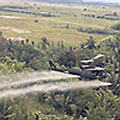 科學家針對2,000多名曾參與越戰的空軍退役軍人所做的一份研究發現,慣用落葉劑「橘劑」(Agent Orange)內含一種有毒化學物質,不但抑制前列腺發育,同時減少睪丸固酮的量,進而影響男性生殖健康。刊登在11月份《環境健康透視》期刊上的研究指出,暴露在 TCDD中或許會以數種方式干擾男性的內分泌和生殖系統。TCDD是戴奧辛類化合物中最具毒性的一種,落葉劑「橘劑」中亦有此成份。
科學家針對2,000多名曾參與越戰的空軍退役軍人所做的一份研究發現,慣用落葉劑「橘劑」(Agent Orange)內含一種有毒化學物質,不但抑制前列腺發育,同時減少睪丸固酮的量,進而影響男性生殖健康。刊登在11月份《環境健康透視》期刊上的研究指出,暴露在 TCDD中或許會以數種方式干擾男性的內分泌和生殖系統。TCDD是戴奧辛類化合物中最具毒性的一種,落葉劑「橘劑」中亦有此成份。
「至目前為止,我們並沒有很好的證據顯示戴奧辛是否會影響人類的生殖系統,」古普塔醫生(Dr. Amit Gupta)說。他是德州大學西南醫學中心的泌尿科醫生,以及這份研究報告的主要作者。「現在我們知道戴奧辛與人類前列腺有關,這讓我們懷疑戴奧辛或許會減緩人類前列腺的生長,如同我們在動物身上看到的情形。」
橘劑是美軍及其盟友為了在越南的軍事用途而研發的落葉劑,用來清除覆蓋和隱藏敵軍的植物。
研究人員發現曾經暴露在戴奧辛下的退伍軍人較少得到良性前列腺肥大(BPH),這是一種前列腺增大的疾病。病人必須用力才能排尿,且有頻尿現象。前列腺肥大並會造成如不能排尿及尿道感染等併發症。雖然研究發現較少的前列腺肥大發病率,古普塔醫生認為,這個發現不應視為一項正面的結果。他說:「人們可能認為罹患前列腺肥大的風險降低不算是有害的影響,但更大的問題是,戴奧辛會影響正常發育與生殖系統的發展。」
德州大學西南醫學中心的泌尿科主任,也是這項研究的作者羅耳波(Dr. Claus Roehrborn)說:「我們知道戴奧辛會造成人體許多內分泌失調。這項研究間接顯示前列腺肥大是一種內分泌失調。」
這項研究是以空軍健康研究的資料為基礎,這項資料為針對2000名以上越戰時負責噴撒落葉劑的空軍退伍軍人為對象的流行病學研究。他們噴撒的落葉劑包括橘劑。在6次檢測循環中,這些退伍軍人接受面談,並進行身體檢測及實驗室檢驗。第一次檢測是在1982年,所以這些退伍軍人被追蹤監測超過20年。
「我們發現讓對照組增加暴露在戴奧辛中,得到前列腺肥大的風險就會降低,」德州大學達拉斯公共衛生校區的環境科學教授表示。古普塔醫生指出,研究顯示接觸較高的戴奧辛與睪丸固酮減少有關。「較低的睪丸固酮與性功能低落、肌肉及其張力減少、不孕、容易疲勞、憂鬱,和骨骼密度降低有關,」吉普塔醫生說,「不過,我們不能由這項研究斷然判定這些退伍軍人是因為暴露在戴奧辛下,才會造成這些不良影響。」
A toxic chemical contained in the herbicide Agent Orange affects male reproductive health by limiting the growth of the prostate gland and lowering testosterone levels, researchers have found in a study of more than 2,000 Vietnam War Air Force veterans.Published in the November issue of the journal "Environmental Health Perspectives," the study indicates that exposure to TCDD, the most toxic of the dioxin family of chemicals contained in Agent Orange, may disturb the male endocrine and reproductive systems in several ways.
"Until now, we did not have very good evidence whether or not dioxins affect the human reproductive system," said Dr. Amit Gupta, an urologist at the University of Texas Southwestern Medical Center and the study's lead author. "Now we know that there is a link between dioxins and the human prostate leading us to speculate that dioxins might be decreasing the growth of the prostate in humans like they do in animals," he said.
Agent Orange is an herbicide that was developed for military use in Vietnam to deny cover and concealment to enemies of the United States and its allies.
The researchers found that veterans exposed to dioxin had lower incidence rates of benign prostate hyperplasia, BPH, a disease that is caused by an enlargement of the prostate. Patients must strain to pass urine and they urinate frequently. BPH can lead to complications such as an inability to urinate and urinary tract infection.
Although the study found fewer incidences of disease, Dr. Gupta cautioned that the finding should not be interpreted as a positive result. "It may be construed that a decrease in the risk of BPH is not a harmful effect, but the larger picture is that dioxins are affecting the normal growth and development of the reproductive system," he said.
Dr. Claus Roehrborn, professor and chairman of urology at UT Southwestern and a study author, said, "We know that dioxin causes many endocrine disturbances in the human body. The study indirectly proves that BPH is an endocrine disorder."
The study was based on data from the Air Force Health Study, an epidemiologic study of more than 2,000 Air Force veterans who were responsible for spraying herbicides, including Agent Orange, during the Vietnam War. The veterans were interviewed and underwent physical examinations and lab tests during six examination cycles. The first cycle was conducted in 1982, so the veterans were followed for more than 20 years.
"We found that the risk of developing BPH decreased with increasing exposure to dioxins in the comparison group," said Dr. Arnold Schecter, professor of environmental sciences at the UT School of Public Health Regional Campus at Dallas and a study author. The study shows that higher dioxin exposure is associated with decreased testosterone levels, Dr. Gupta said."It is known that lower testosterone levels are associated with decreased sexual function, decreased muscle mass and strength, infertility, increased fatigue, depression and reduced bone density," Dr. Gupta said. "However, we could not conclude from this study that dioxin exposure did lead to any of these adverse affects in the veterans in the study."





